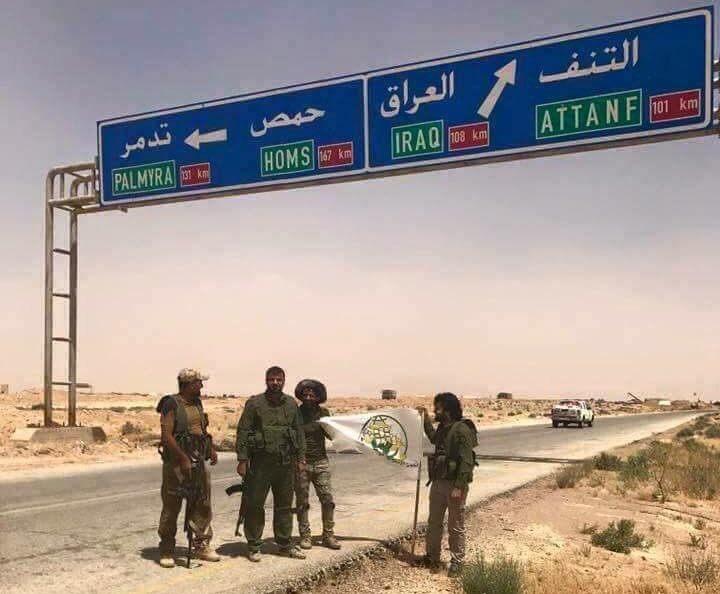
RNA - According to the Arabic-language al-Sumeria television news agency, the paramilitary fighters, consisting of some 40 mainly Shia Muslim groups, reached the Syrian border in the north on Monday, and are further tightening the noose around Daesh in the strategic town of al-Ba'aj.
"The Hashd al-Sha’abi forces just reached the Iraqi-Syrian border" announced Secretary General of Iraq’s Badr Organization Hadi al-Ameri on Monday, adding that their fighters had already stationed in the border village of Um Geris.
Earlier in the day, the pro-government forces had liberated the two villages of Taro and Wadi al-Midar, both located west of al-Qahtanyia area, which was completely freed on Sunday.
The two villages are also located north of the flashpoint town of Ba'aj, which, according to Sheikh Sami al-Masoudi, another Hashd al-Sha’abi leader, "is a strategical town for Daesh as it is the last supply line", linking the terror group with the war-torn Syria.
Masoudi, whose remarks came shortly before Ameri's announcement of reaching the Syrian border, added that as soon as the PMU forces reached the border, they "will erect a dirt barricade and dig a trench to derail Daesh move."
The Hashd al-Sha’abi forces, backed by the air force, launched a major offensive on last Monday to liberate Ba'aj and its surrounding villages and areas from the grips of Daesh, trying to reach the Syrian border and cutting the vital supply line of the terror group, whose days are numbered in Mosul, their last urban bastion in the Arab country.
The PMU forces reportedly number more than 100,000 fighters. Iraqi authorities say there are between 25,000 and 30,000 Sunni tribal fighters within their ranks in addition to Kurdish Izadi and Christian units.
The fighters have played a major role in the liberation of Daesh-held areas to the south, northeast and north of the Iraqi capital, Baghdad, ever since the terrorists launched an offensive in the country in June 2014.
Daesh losing more ground in Mosul
Iraqi forces on Monday launched a fresh wave of offensive against the remaining Daesh terrorists, holing up in Mosul's Old City.
"Our units are continuing to advance... and entered al-Saha al-Oula and al-Zinjili and al-Shifaa neighborhoods and the Republican Hospital," announced Iraq’s Joint Operations Command (JOC) spokesman Brigadier General Yahya Rasool.
Mosul, the second largest city in Iraq, fell to Daesh in 2014, when the terrorist group began its campaign of death and destruction in Iraq, making the city its de facto capital in the Arab country.
Since October 2016, Iraqi army soldiers and allied volunteer fighters have been leading a major operation to recapture Mosul. They took control of eastern Mosul in January and the push for the western side, separated from the east by the Tigris River, commenced in February.
Latest figures show that Daesh has control in less than 10 percent of the city, mainly in the north of the densely populated Old City. However, the liberation of the last militant-held patches proved more difficult than previously expected, as Takfiri terrorists have dug in among civilians and are fiercely fighting back with explosive-laden vehicles, booby traps, mortar fire and snipers.
Furthermore, army tanks and heavy vehicles are incapable of passing through the Old City's narrow and maze-like streets.
Rasool also noted that the Iraqi aircraft had dropped thousands of leaflets over the Old Mosul and several other areas of the city overnight, "urging citizens to leave toward our security forces."
Hundreds of thousands of people have already been displaced by the fighting in Mosul, and the figure is likely to mount as Iraqi forces close in the last Daesh-held enclave in the city.
Meanwhile, Staff Lieutenant General Abdulghani al-Assadi, a high-ranking commander of Iraq’s Counter-Terrorism Service (CTS), announced that the Iraqi forces had managed to liberate 49 residential buildings from the grips of Daesh. He added that 119 Daesh terrorists had also been killed in the operation.
"Daesh terrorists are directly targeting civilians," Assadi further noted, adding that to save more lives, the security forces had provided a number of transporting vehicles to evacuate as many as civilians from the battle grounds to safe zones.
Also on Monday, Iraqi Prime Minister Prime Minister Haider al-Abadi visited some liberated areas of Mosul and met with the Iraqi troops in the area.
The full liberation of Mosul would spell the end for the Iraqi half of Daesh's so-called caliphate.
847/940